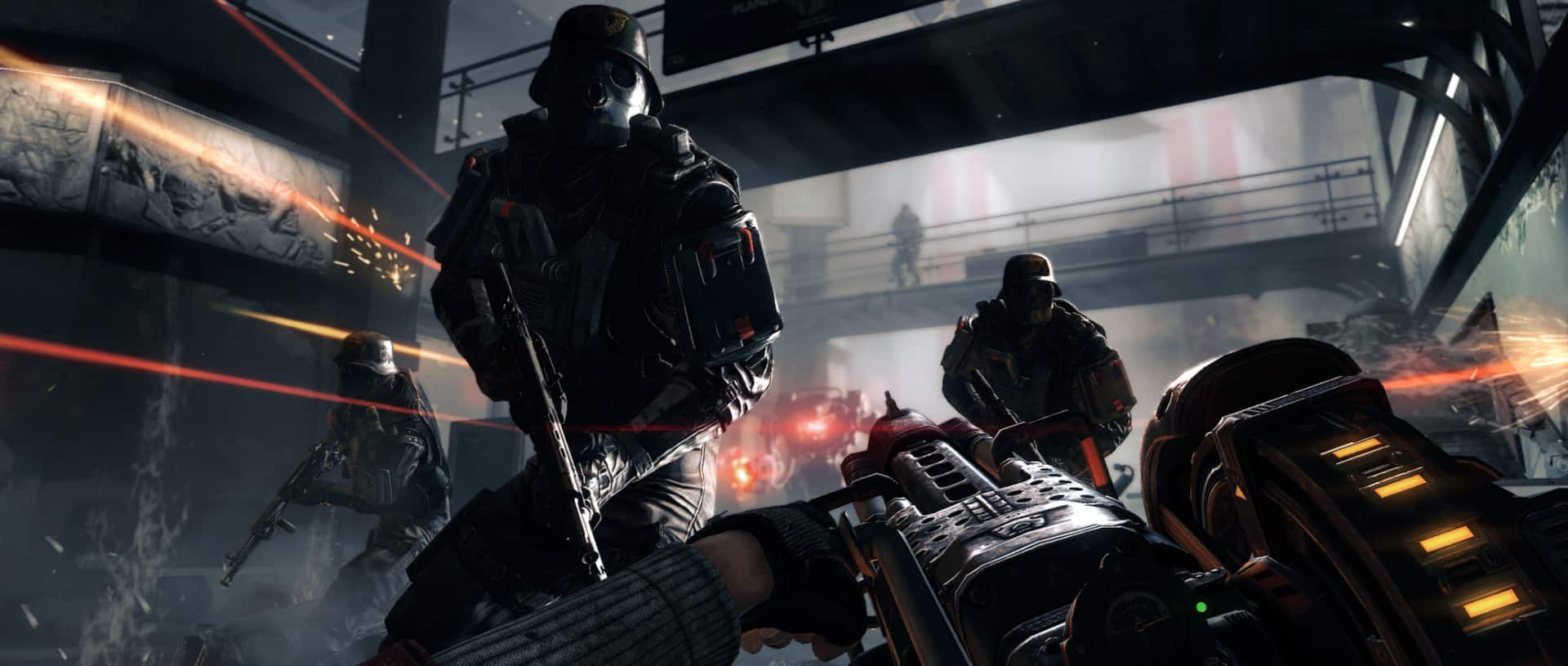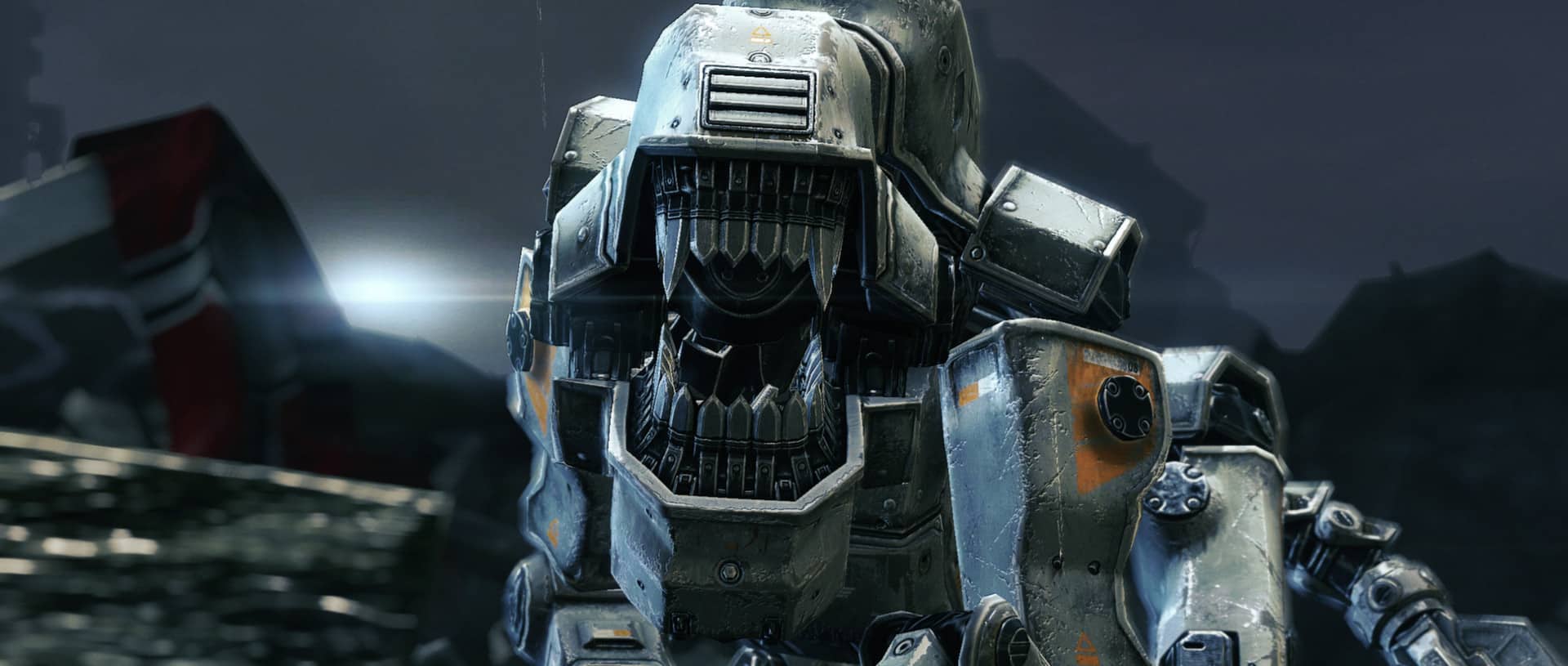Wolfenstein: The New Order Explores the War Against Trauma

You know what I commend most about Wolfenstein: The New Order? The first thing that comes to mind? IT's not laser guns, towering boss fights, or bombastic explosions. It's a conversation between protagonist William "BJ" Blazkowicz and his friend Caroline Becker. You see, The New Govern is something of a sequel to 2009's Wolfenstein, and that entry ended with Caroline thrown seemingly to her last. When you'Re reunited almost a decade later o in an alt-history 1960s dominated away a Nazis-subordinate world, trauma has changed them some.
It's not a question of faltering resolve, just William's got several chunks of debris lodged in his head and Caroline's ill from the legs set. All is world-wary, bearing the scars of fighting a relentless war against the Reich that would see them wiped out for such ailments. That alone makes William and King of England's fight instantly understandable, but there's a difference 'tween justification and what it means for them.
Caroline's been relegated to a wheelchair for years, and she necessarily your helper liberating individual experimental helicopters for the resistance. Once tucked inside the cockpit, the 2 finally catch up on what happened between Wolfenstein and The New Order. Caroline recalls the painful memories of her back breaking and the surgeries to save her life. She suffered greatly for the cause to stop the Nazis, and her reward is to struggle even harder. Yet when William apologizes for the loss of her legs, Caroline responds quickly, "Don't follow. I've learned how to tent-fly," every bit the helicopter bursts into the flip, an wee exult in their renewed war against the Reich.
This moment is the dissertation of The Novel Order. No substance how unrelentingly cruel the human race may glucinium, we can overcome it. For every door shut, there's another way. You have to strive for hope, and in doing sol, go a radio beacon to others. William's return is for sure handy for all his Nazi-stomping capabilities, but at the oddment of the day, it's how he heartens the resistance that ensures victory.
It's through aiding him that Anya finds purpose, and their burgeoning honey inspires her to consider that there is a chance for something better. Before they met, she'd been fight all along her own, striking backbone at the Nazis as she could but standing unable to save her parents. The rest of the resistance fits exclusive a single house, each appendage pulling three-base hit duty, but a lone serving hand eases their struggles. Multiple quick sidequests dive deeper into from each one character's backstory and their current struggles, whether information technology's backward toys to a mentally handicapped penis's bedside operating theater hybridization generational lines to reach a frustrated younger phallus of the team.
Whichever of the ii Allies you chose to save at the opening of the game is at the end of their rope in particular, leaning on William while grappling with survivor's guilt later on every last these years. At the same clock time the guilt of failing to catch General Deathshead weighs heavy on William, filling his internal monologue along the way. William lost soh practically time and can't begin to procedure all the lives atomic number 2 could've saved — merely there's nothing he can do about that. All that can embody done is to rise up and pick up the fight.

Worst of all is the slew of Unmoving Roth, a Mortal inventor you discover in the game's shockingly not-in-bad-discernment concentration camp level. Set and William debate whether God is testing the world, to which Set bitterly chuckles, "If Supreme Being is examination us, then we are unsatisfactory gloriously." Yet, He never Michigan working to bring around his fellow inmates, nor does he recoil in the face of death. Equivalent altogether your Allies, Set Roth is a man who has overcome the fear of death and all the nuisance that the Nazis have dealt him. He doesn't deny the horrific state of the world. He doesn't deny the odds for himself and the resistance, but he keeps warring anyway.
By contrast, the Nazis that hound you aren't downcast or dour. Deathshead insists, "I don't like that nominate. I'm a happy man, see?" with a dishonorable grin. General Engel and her son toy shlep direct the plat like honeymooners, threatening you with a test while you'Ra undercover to see if you'Re a unpolluted-blooded Primitive person or a riotous only to then laugh and say it's entirely a trick. These horrible hoi polloi gaslight you, sentence you, take nothing but the intense pleasure in ensuring your suffering. They sow injury with every step, not even because it's necessary but because they can.

This is what makes Wolfenstein: The New Enjoin such a departure from most Second World War games. It's non simply about fighting the Nazis because they'ray an sluttish baddie to bolt into an FPS, but instead IT's about what they represent. A cold, heartless machine that bruises, abuses, and crushes all those in its way. The state of war William faces isn't against a faceless enemy but of creatures so twisted and devoid of empathy that they feel absolutely inhuman.
That's why all carry out you take is to dismantle that machine and salve any you can. When you bunk the stockade, William crying done cell embarras after cell block. Each itsy-bitsy party favour you do for your allies grants a moment of relief to your fellow survivors. For however much devastation William unleashes, it's always in service to protect and liberate, not oppress. Everyone he and the resistance struggles for sportsmanlike wants to pull through, to exist, unhampered fear of someone stomping down on them for beingness who they are. So that they have a chance to fly, and be free of this pain.
https://www.escapistmagazine.com/wolfenstein-the-new-order-explores-the-war-against-trauma/
Source: https://www.escapistmagazine.com/wolfenstein-the-new-order-explores-the-war-against-trauma/